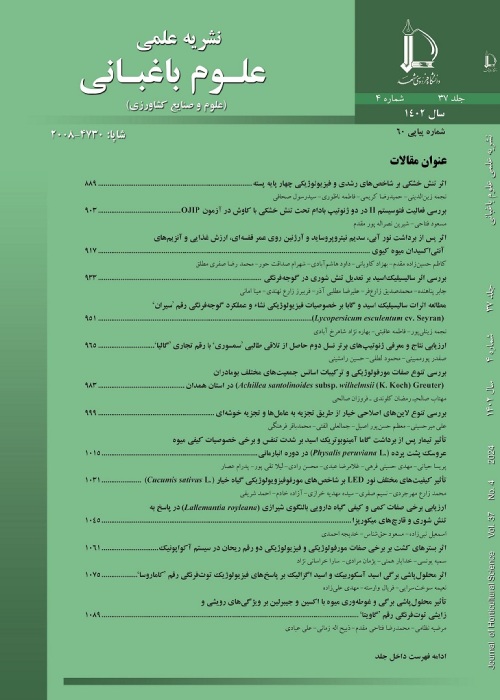The Effect of Bacterial Endophyte (Exigubacterium aurantiacum) Isolated from Salsola imbricata on Growth Characteristics of Tomato Seedlings under Salinity Stress
Author(s):
Article Type:
Research/Original Article (دارای رتبه معتبر)
Abstract:
Introduction
Tomato (Solanum lycopersicum L.) is a common vegetable that is widely cultivated and consumed worldwide in the Solanaceae family (global tomato production is estimated at approximately 182 million tons in 2017). Tomato, because of its elevated nutritional value, is the second most common vegetable commodity in the world after potatoes. As with other crops, the global production of tomatoes is threatened by certain biological stresses (such as pests, plant diseases and weeds) and non-biological stresses (such as salinity, drought, floods, cold and heat stress). Nowadays, the excessive use of chemical fertilizers in tomato production in order to increase yields, has resulted in environmental pollution and dangers on the health of consumers. The reaction of cultivated plants to these challenges is indicated by numerous morphological, physiological, biochemical and molecular changes, leading to a direct and indirect decrease in plant growth and productivity. Salinity as a non-biological stress can cause osmotic or ionic imbalance in plant cells. Salinity stress also limits growth and germination by affecting water and reducing water availability and affects crop production. Endophytes represent an eco-friendly option for the promotion of plant growth and for serving as sustainable resources of novel bioactive natural products. One of the alternative ways to restore normal plant growth under salinity stress may be to use plant growth to stimulate endophytes. Endophytes can play an important role in plant survival under salinity stress by reducing the adverse effects of sodium ion. Therefore, this work provides strong evidence that endophyte halophyte can be beneficial for tomato that help tolerate the plants stress. Materials and Methods
The main aim of this study was to investigate the role of endophytic bacteria (Exigubacterium aurantiacum), isolated from Salsola imbricate, in improving the growth of Solanum lycopersicum L. (8320) under salinity stress. The salinity tolerance potential of bacterial endophytes was investigated in vitro. The bacterial was cultured in Nutrient Agar with different concentrations of NaCl (1, 2 and 3 M) and its growth dynamics were investigated after 24 and 120 hours. To prepare the bacterial suspension for inoculation with tomato seeds, the bacteria were cultured on NB (Nutrient Broth) medium for 24 hours in an incubator at 28±1 °C at 130 rpm. The OD suspension was adjusted to a concentration of 1×108 ml. Tomato seeds (cultivar 8320) were washed with ethanol (70%) for 30 seconds and then sterilized with 0.5% sodium hypochlorite for 90 minutes and then completely distilled three times with distilled water. They were autoclaved and washed. For better contact of seeds with bacteria, 1% carboxymethylcellulose was used and then the seeds inoculated with bacterial treatments were placed on a shaker for six hours. Seeds inoculated with bacterial endophytes were planted in seedlings and then placed in pots containing autoclaved soil in the greenhouse of the Faculty of Agriculture, Hormoz University. The experiment was arranged in a factorial experiment based on randomized complete block design with three replications. Experimental treatments included five levels of salinity stress (0, 4, 6, 8 and 10 dS/m-1) and bacterial endophyte inoculation (E. aurantiacum). Analysis of variance of traits was performed using SAS software version 9.4 and the means were compared using LSD method with a probability level of p < /em> Results and Discussion
Analysis of variance showed that among treatments there is significant difference on growth parameters of tomato seedling (p < /em> 0.01), this indicate the positive impact of the bacterial endophyte on the growth parameters of tomato seedling is inoculated with the bacterial than the control plants. In this experiment, stem height, dry weight of stem, leaf and root, percentage of electrolyte leakage, chlorophyll a, chlorophyll b, carotenoid, proline and carbohydrate content were examined. The results of mean comparison showed that salinity stress significantly reduced stem height, stem dry weight, leaves and roots, chlorophyll a, chlorophyll b, carotenoids and increased electrolyte leakage; however, bacterial endophyte reduced the negative effects of salinity stress on tomatoes. Tomato seedling treated with endophytic bacteria showed higher levels of key osmolytes, total soluble carbohydrates and free proline compared to untreated plants under salinity stress. Conclusion
The results also showed that the use of endophytic bacteria increased the growth of tomatoes in saline soil and water, thereby it can be used as an effective tool for growing salinity-sensitive plants such as tomatoes in saline conditions.Keywords:
Language:
Persian
Published:
Journal of horticulture science, Volume:35 Issue: 1, 2021
Pages:
153 to 167
magiran.com/p2268350
دانلود و مطالعه متن این مقاله با یکی از روشهای زیر امکان پذیر است:
اشتراک شخصی
با عضویت و پرداخت آنلاین حق اشتراک یکساله به مبلغ 1,390,000ريال میتوانید 70 عنوان مطلب دانلود کنید!
اشتراک سازمانی
به کتابخانه دانشگاه یا محل کار خود پیشنهاد کنید تا اشتراک سازمانی این پایگاه را برای دسترسی نامحدود همه کاربران به متن مطالب تهیه نمایند!
توجه!
- حق عضویت دریافتی صرف حمایت از نشریات عضو و نگهداری، تکمیل و توسعه مگیران میشود.
- پرداخت حق اشتراک و دانلود مقالات اجازه بازنشر آن در سایر رسانههای چاپی و دیجیتال را به کاربر نمیدهد.
In order to view content subscription is required
Personal subscription
Subscribe magiran.com for 70 € euros via PayPal and download 70 articles during a year.
Organization subscription
Please contact us to subscribe your university or library for unlimited access!


